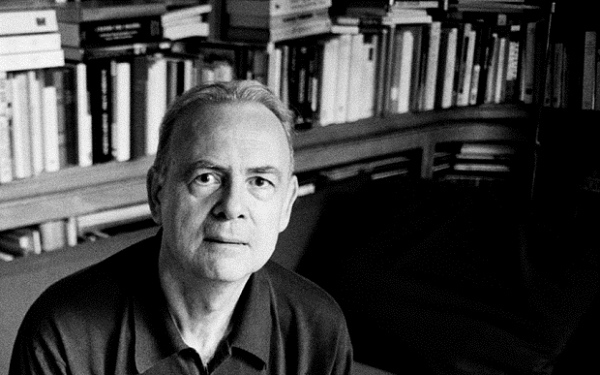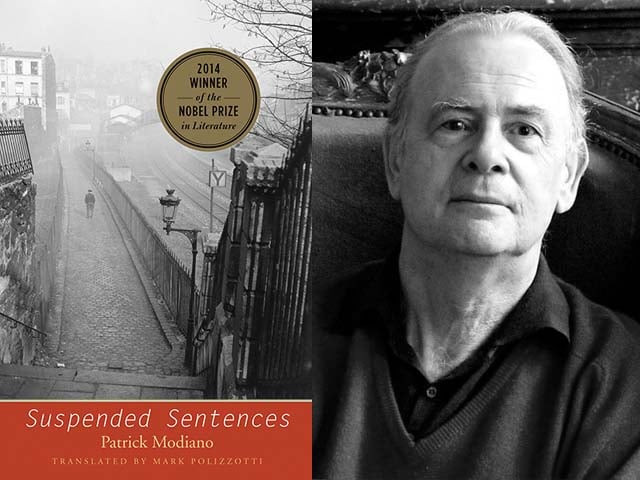In 2014, when the Swedish Academy awarded the Nobel Prize in literature to Modiano, the literary world was caught off guard. A household name in France and a celebrated figure in European literary circles, Modiano was little known elsewhere. With as much as 20 books scheduled for translation and international publication, Modiano’s oeuvre is starting to find a wider audience that it rightly deserves.
In awarding him the prize the Swedish Academy praised him
“For the art of memory with which he has evoked the most ungraspable human destinies and uncovered the life-world of the occupation.”
 Photo: Guardian
Photo: GuardianPeter Englund, the permanent secretary of the Academy hailed him as ‘a Marcel Proust of our time’. After reading some of his books, one can only agree. Like Proust, Modiano is interested in the labyrinths of memory, traversing through which his characters come to terms with their past.
Suspended Sentences, a dazzling collection of three novellas, is now available to readers worldwide in Mark Polizzotti’s vivid and beautiful English translation. The three novellas in this book, Afterimage, Suspended sentences and Flowers of ruin, first appeared in France between 1988 and 1993. Although these novellas essentially appear to be independent pieces, they are beautifully woven together, and much like Modiano’s entire body of work, they make subtle and repeated connections with one another and many of the leitmotifs and themes are stitched brilliantly together in unison. They are identical in their ruminative tone, interlaced in their murky subject matter and all are concerned with memory and identity.
 Photo: File
Photo: FileIn the first novella, ‘Afterimage’, the narrator is recollecting memories of a photographer called Francis Jensen, who he met and knew in Paris as a young man. After realising the quality of his magnum and avant-garde work the narrator decides to undertake the task of cataloging the photographer’s archives. In doing so, he is piecing together the parts of a puzzle that help him understand why the eccentric photographer slowly and resolutely drifted away from life.
The title novella, ‘Suspended Sentences’, is the standout in this small collection. It is the also the liveliest of the three. It takes the form of a childhood memoir in which young Patoche is abandoned by his parents and is living with a surrogate family along with his brother. The family is no ordinary one. The life in their house is densely populated by peculiar family friends who arrive in opulent American cars and hold surreptitious meetings with the family. As young Patoche reminisces the jouncing memories of his time there, he is flooded by a distant feeling of suspicious nostalgia.
The final piece, ‘Flowers of Ruin’ is darker and more mysterious than its predecessors. The narrator recalls his teenage years in Paris, during the 1960s, and traces the connections between the people he knew and the “tragic orgy”, during which a young and newly married couple commits suicide for unknown reasons after they attend a party one evening with a few other couples who are even more dubious and strange.
In these three, svelte and minutely observed novellas, memory and experience are marked by fluidity and transience. The lives of the characters flicker against the tapestry of the past and they slide back and forth in time. And in this book, through his delicate, subtle and restrained observation of his characters’ past lives, Modiano creates a fine and frightening study of how the past preys upon the present.
‘Suspended Sentences’ is so flawlessly written that it feels as if Modiano is drawing us into a dream. From the opening sentence of this book, I felt myself under the spell of a master storyteller and a brilliant prose stylist. These novellas are written in Modiano’s signature style which mixes restrained elegance with laconic tenderness and dry humor. His novels have often been described as the literary form of detective stories, however, the irony is that the mysteries he scrutinises are never completely solved, hence he keeps returning to them and treads the same terrain again and again with an uncanny compulsiveness.
‘Suspended sentences’ verifies our ability to remember as a mean of saving our moral and empathetic identity. Modiano’s characters are concerned with examining their consciousness and searching for their identity, and this tangled trail becomes more essential as they slowly become more disconnected from their lives. The three novellas in this exquisite and splendid collection are as accessible as they are engrossing and as mysterious as they are poised. And what gives this book an air of amiable readability is that Modiano’s style is as lucid and uncomplicated as his subject matter is weighty and dark.
While there is a plethora of picaresque images and rich atmospheric detail, the prose is never dense. In fact, one of the greatest pleasures of reading this book is Modiano’s supremely light touch and the smoothness of his prose. Another thing that Modiano obsessively toys with is ambiguity, which lingers palpably on every page of the book. The narrative, in each of the novellas, seems to encircle a theme that is never blatantly discussed. There is no climax in these stories. And though one turns the mesmerising pages with delightful anticipation, fervently awaiting for some revelation that accounts for and explains all the mysteries but Modiano doesn’t grant his readers that satisfaction.
 Photo: Guardian
Photo: GuardianHe continuously drops hints and instigates speculations, but he leaves the reader enmeshed in a bizarre sense of bewilderment. He gives us the plot and the characters, but he leaves the job of creating the meaning of its experience to us. Hence, finishing the book one shares the feelings of one of the characters in the book:
“It’s like in the morning when you try to recall your dream from the night before, but all that’s left are scraps that dissolve before you can put them together.”
“Suspended Sentences” might not be Modiano’s major and most popular work, but, nonetheless, it is an excellent place to introduce the readers to his expansive opus. It is as good as anything he has ever written. Almost every sentence is a thing of beauty and the three novellas as a whole will prove to be a joy. There’s something memorable on every page and the book as whole casts a spell, one to which anyone with a liking for masterly narrative sweep, richly textured prose and imaginative flair and depth, will be happy to submit to.



COMMENTS
Comments are moderated and generally will be posted if they are on-topic and not abusive.
For more information, please see our Comments FAQ